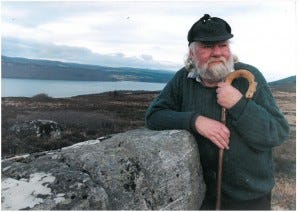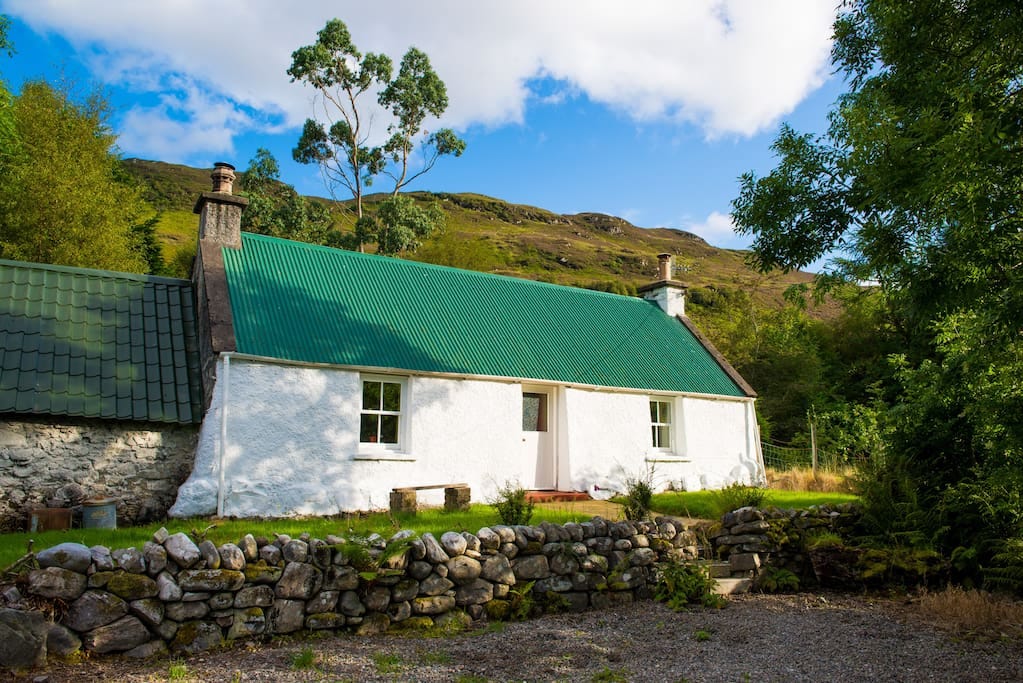I cannot come to another New Year’s Eve without thinking of a particular character whose sagacity graced our lives, if only once a year. To understand, let me offer a brief treatise on Celtic para-psychology.
Scotland is divided into the Highlands, Lowlands, and The Borders. From Inverness to the north lie the Highlands, an area of geographic distinction from the rest of the country. The Highlanders belong to the various clans that claim particular, sometimes spectacular, roles in the history of the northern Britons.
If you are of Scots descent, you know what that means. If you aren't, well, it's a bit hard to explain.1
Highlanders are by turns aristocratic and common; sagacious and intemperate, literate and pre-verbal. Because of their historic isolation from the other areas of Scotland, they became self-sufficient and redoubtable, forming the tightly-knit system of clan membership that kept them protected from the vagaries of Nordic invasion and English rule.
In such an atmosphere, Highlanders also tended to be closer to the more mystical elements of experience. Hence, they claim to have developed an acute form of what psychologists refer to as hyper-observation. In the Highlands, it's called "second sight".
Those blessed, or cursed, with second sight can predict events before they happen, note occurrences from hundreds or even thousands of miles away, and receive terrific visions.
My Great-Granny MacKay, a Highlander, could be positively spooky sometimes in her casual prognostication. When I was four she informed me that I would be a teacher, although a different kind from my parents, that I would stand in a box among a large group of people, and that I would find balance in the sea.
So, she covered priesthood, preaching from a pulpit, and surfing. All of this one morning over corn flakes and Red Rose Tea. Not bad.2
My grandfather, a Lowlander, used to try to get her to pick horses for him at the track, but she was not keen on betraying the gift so that her son-in-law could win a few extra bob at the track. Besides, some of her prognostications could be wondrously obscure.
While every clan has its seer, official or otherwise, there is usually one who stands out even in the competitive world of Highland para-psychology. That man or woman is declared a "Highland Seer", although I do not think the office is all that formal.
The first so recognized was Coinneachd Odhar3 of Brahan in the 17th century, who died after being "burned in a barrel of tar at Chanonry Point on the Black Isle on the orders of the Countess of Seaforth, after he declared he 'saw' her husband in dalliance with a courtesan in Paris."4
Pro-tip: Be circumspect when telling the truth to unstable people with money and power.
For a fair part of the 20th century, the best known Highland Seer was Swein MacDonald. Well, depending on whom you ask. To some he was a consummate con artist.
There is not all that much about him online that is accurate. That seems appropriate, as he really did not seek fame or fortune. [Although notoriety he certainly found]. After working as a bricklayer and performing psychic, MacDonald repaired to a humble life in a crofter's cottage in the Highlands, a life many of us would think rather perfect.
From there he would offer his "readings". He charged little for these and gave much of what he made to charity. But, whether a lord or lady, movie star, or undergrad in his cups who dropped in for a visit, MacDonald offered both hospitality and a sometimes frighteningly accurate prediction for them.
My particular memory is that he would be featured on BBC radio every New Year's Eve, telling us what we might expect in the year to come. With a talent for the theatrical, something that can never be taught, his presentation was the only part of New Year's entertainment that I never missed, even after moving back to the U.S. when I would listen to the BBC from Canada on an under-powered shortwave radio.5
MacDonald died in 2003. The current Seer does not seek publicity, so the great accessibility offered by MacDonald is no more, which is understandable, but somewhat of a pity. Highlanders never seek to be regarded as "grand;” you see. That is best left to the Lowlanders.
This anecdote from MacDonald's life is to be found in a remembrance of him published in The Herald of Scotland upon his death. There is something wonderfully Highland about it:
"Well-known names in show business, the film industry, and among the nobility regularly called on him, either in person or by telephone. He had offers to be flown to the United States, to Switzerland, and to the Middle East for consultations with the rich and powerful. Of course, the media loved him. The skeptical news editor of a Glasgow-based paper telephoned him gruffly to arrange an interview. ‘I don't like your attitude, my man,'' Swein told him stiffly, ‘and furthermore you are conducting an illicit affair with a woman called M.’ The startled news editor abruptly terminated the call."
Here is something from the BBC, if you have a Facebook account.
Also, if you add a jigger of blended Scotch to a pint of Scotch Ale you will have created a drink called a Swein MacDonald.
I suppose that’s because you will be troubled with visions if you drink enough of it.
My mother was a Highlander, so I was raised with this folklore.
I suppose this could have meant that I would be teaching in a prison, placed in glass booth while on trial, or lost at sea.
Yeah, I can’t pronounce it, either.
from Tremayne's History of the Scottish Folk: The Highlands
The area of Northeastern Ohio in which I grew up is only 55 miles from Ontario, as long as one travels due north by way of Lake Erie, as does a radio/TV signal. We used to watch British TV shows on Channel 10 from London, Ontario, too, back in the pre-cable/streaming days of only three TV channels.







Great read! Because of Gramma, I still drink Red Rose tea almost everyday. Also, the Swein MacDonald sounds like it might be good. I’ll have to try it sometime. I’ll take whatever visions coincide.